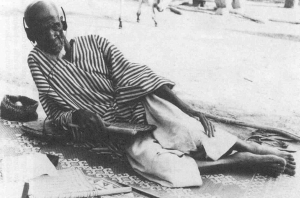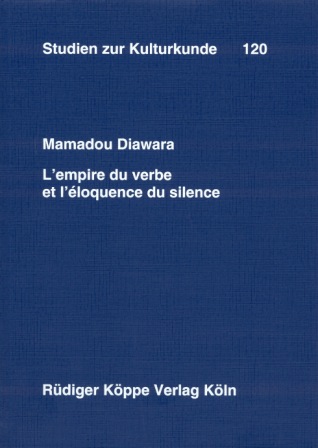

L’empire du verbe et l’éloquence du silence
Vers une anthropologie du discours dans les groupes dits dominés au Sahel
Author: Mamadou Diawara. Series edited by: Beatrix Heintze, Karl-Heinz Kohl.
Series: SzK Studien zur Kulturkunde Volume 120
2003462 pp.
1 map, 9 b/w photos, 5 tables, 2 diagrams, appendix: La légende de Daaman Gille par Musuntu Daramme de Jaara, Nioro du Sahel, Mali (985 stanzas in Bambara with translation into French), index of persons and places, subject index
Text language(s): French
Format: 170 x 240 mm
860 g
Paperback
€ 69.80
Buy 'L’empire du verbe et l’éloquence du silence' as a downloadable PDF document directly from our online shop »
Order 'L’empire du verbe et l’éloquence du silence' as print edition »
This anthropological analysis of oral literature in the West African Sahel region, an arid region encompassing Mauritania, Mali, Burkina Faso, and the Republic of Niger, draws attention to the importance of silence as a meaningful aspect of orality. The author bases his analysis on a selection of legendary stories concerning Daaman Gille, the founder of the Jawara dynasty in 16th century Jaara in the North-West of the current Republic of Mali, his servant Jonpisugo and Sunjata, one of his many adversaries. In the strictly hierarchical society of Jaara, oral poets (Griots) were mainly drawn from the lower strata of dependent servants who composed legends and stories in the service of aristocratic patrons.
Part of the presented legends were recorded by the author during the 1970s and 1980s, another part was drawn from the transcriptions and translations produced by colonial officials, travellers and scientists. To put these legends into a broader historical context, the author uses the 17th and 18th century chronical sources from Tombouctou. The study is meant as a contribution to the history of the sociology of narration, the evolution of narrative situations and occasions.
The author details how the past as contained in the legends is perceived by today’s ordinary people, and how this notion of the past has developed due to the changes in society during the last decades, among them the genesis of the artist entrepreneur, the rise of a market economy or the availability and influence of radio, television and tape recordings. Special emphasis is placed on the silence, i.e. that which is left unsaid in the stories.
If the African oral tradition is considered in a comprehensive context of its performance, including the narrator and the audience, it becomes clear that silence and listening are as important for the glorification of the power of the protagonist Daaman Gille as the actual spoken words. All of the analysed stories are printed in the original in the appendix, along with a French translation.
Dr. Mamadou Diawara is Professor at the Institute of Social Anthropology, Goethe University Frankfurt am Main, Germany, and is Director of «Point Sud», the Research Centre for Local Knowledge in Bamako, Mali.
Under these links you will find further text collections and analyses of oral literature(s) and the history of Mali and West Africa:
Accompanying material:
- Animal Husbands, Magic Horns and Water Spirits
(ISBN 978-3-89645-221-4 ) - Heinrich Barth et l’Afrique
(ISBN 978-3-89645-220-7 ) - Le jeu et le sérieux
(ISBN 978-3-89645-208-5 ) - Nyagalen Mugan Tarawele
(ISBN 978-3-89645-263-4 ) - Perpetuating the Politics of Praise
(ISBN 978-3-89645-213-9 )
Cross-reference:
- Finding Female Voice
(ISBN 978-3-89645-282-5 ) - Lexikon der afrikanistischen Erzählforschung
(ISBN 978-3-927620-64-3 ) - Mandinka Spoken Art
(ISBN 978-3-927620-63-6 ) - Sprache und Musik in Mandinka-Erzählungen
(ISBN 978-3-89645-265-8 ) - Temne Stories · Erzählungen der Temne · Mump me Themne
(ISBN 978-3-927620-76-6 ) - The Voice of the Elders
(ISBN 978-3-89645-278-8 ) - Verbal Art of the Fon (Benin)
(ISBN 978-3-89645-288-7 ) - Vies quotidiennes à Dakar (Sénégal) / Everyday Life in Dakar (Senegal) / Nettaliy dundin ci Ndakaaru, bis bu nekk
(ISBN 978-3-89645-285-6 )
Reviews
Jan Jansen in International Journal of African Historical Studies, 38/2, 2005, 329-336
Mamadou Diawara nous présente finalement son analyse comme «une forme de quête culturelle» (p. 372), et c’est bien ainsi qu’on peut lire cet ouvrage où le silence fait écho à la parole, où la littérature vient en aide à l’histoire, où l’on n’a jamais fini de se mettre à l’écoute de ce qui ne saurait se dire simplement quand des hommes sont en relation.
Cécile Leguy in Cahiers de littérature orale, 55/2004, 155-158
| « back | Print version | [top] |
 Books
Books Audio
Audio Biographies
Biographies Series
Series Festschrifts
Festschrifts Journals
Journals